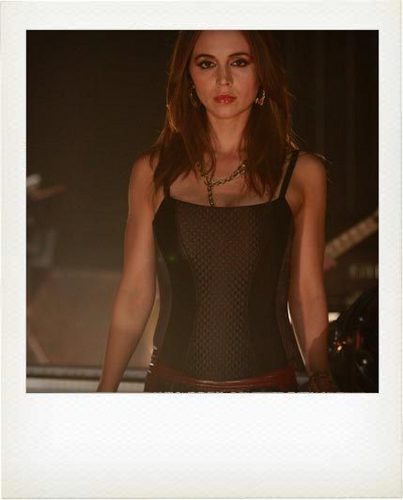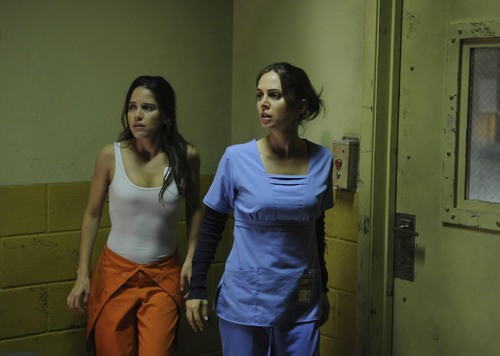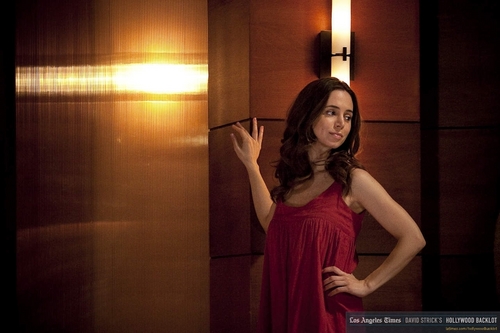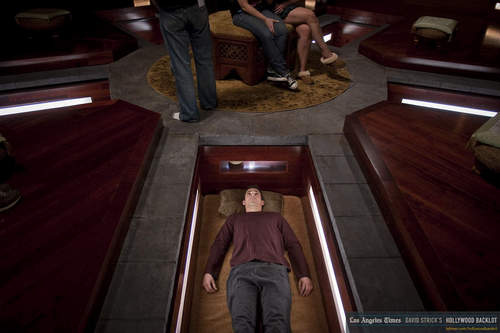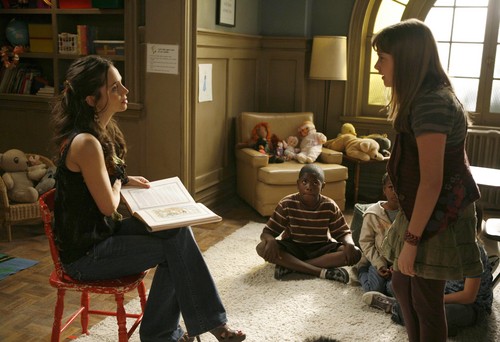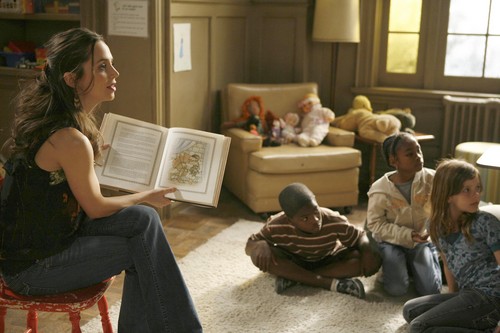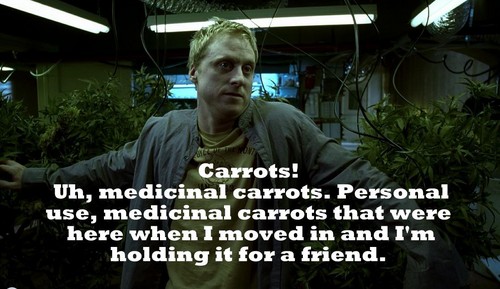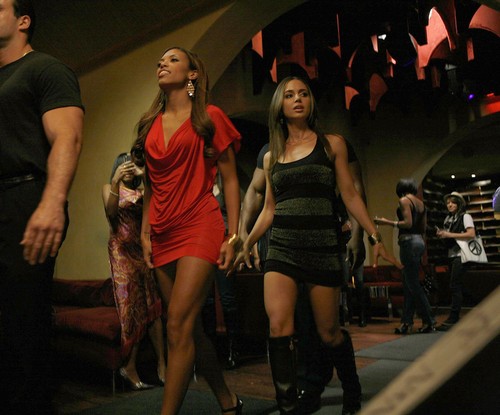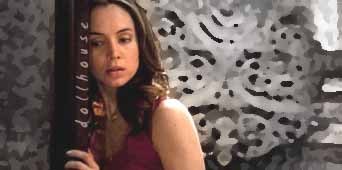(The following is an adaptation of a video response made, spanning link and link)
I like the YouTube show link, but I highly disagree with the link’s assertion that Dollhouse is misogynistic. I’d like to take this moment to address some of its points.
Anita Sarkeesian brings up the issue of how constructing a personality to have sex with someone would be rape because the imprint wouldn’t be able to give proper consent. This is actually explored a bit in the segundo season, but she’s right because it’s not in the first season when the video was made. I would say that Dollhouse would have explored it in detail if they had enough freedom from the raposa executives. They were kind of under a time crunch and had to develop characters and storylines while trying to explore various philosophical issues. I think it’s kind of amazing they got as much in as they did. It is a fault of the show that the issue was never explored in detail, but I think some allowances can be made considering how rushed the show was.
She then says that even as we are meant to view the Dollhouse as antagonistic, we are also encouraged to like it given that our cast of protagonists includes management within the Dollhouse. However, I don’t think that being sympathetic to some Dollhouse employees makes us like the Dollhouse itself. (Okay, I’m going to talk about Boyd now. I’m going to ignore the big twist in season two because this is about season one.) In season one, Boyd is the only truly sympathetic character and that’s because he’s asking perguntas and to all appearances he views the Dollhouse as problematic. He still chooses to work there, but that’s the only way he can make the place better. If he quits, he’ll be given a gag order and mind-wiped or framed if he tries to make it public. If he quits and does nothing, the Dollhouse still exists and he’s easily replaceable. But if he stays, he can at least help take care of the Actives and help inspire subversive thoughts in the other employees.
Again, Dollhouse is a dystopia. It’s like Brazil or District 9 where there are a lot of characters that behave evilly but we are expected to like them because they’re charming or goofy. Sometimes their nonchalant attitude toward horrible things is humor in itself—not sadistically, just in a way that pokes fun at our cultural taboos and reaffirms them. Topher and adele are characters we only like superficially. There are some aspects about them we like, characteristics that make them real people we can relate to, but they are definitely antagonists when they support the evils of the Dollhouse.
(Note that the following stuff about Alpha being scary is based on a misunderstanding I had that what was Anita Sarkeesian expressing her own tastes was part of her argument about Dollhouse being misogynistic.)
Her final point is that Alpha is too gruesomely scary. “I think we have enough crazy, serial killing, murdering men on televisão that we don’t need to add to the repertoire with Dollhouse. The season finale was just blah cover my ears cover my eyes, I didn’t want to watch a single other episode of Dollhouse after that. It was just so grotesquely violent, it was unnecessary, it’s this crazy maniacal guy who was damaged por the dollhouse (which we’re sympathetic to, right?) doing all these crazy things so now he becomes the enemy and the dollhouse is kind of in that grey middle zone area.”
Okay, she seems to be saying that depicting evil murdering men is misogynistic, that doing so contributes to a thematic atmosphere capitalizing on violence against women, thus making it a feminist issue. I don’t see how this is so, considering that the show doesn’t support his violence. It isn’t The Alpha Show, and his violence against women isn’t presented as something enjoyable for the viewer. Echo and Caroline are made his playthings, but they subvert him in a display of feminism and the show endorses that.
The descrição of Alpha as being made evil por the Dollhouse isn’t accurate. That’s what the characters assume at first, but it comes out that Alpha was an evil misogynist in his original personality, thus making him really that underneath everything. And the Dollhouse is always portrayed as morally gray. It can do good things, and it can also be horribly abused. That’s one of the main ideas of the show.
Is it really unnecessary and just gratuitous to have Alpha as this horrible serial killer? The thing about having a show about a hypothetical powerful technology is that you want to explore everything that could be done with it, including the bad stuff. It’s like Isaac Asimov’s link, which were meant to be misinterpreted with terrible consequences. Something that could happen with the imprinting technology is making a super-powerful psychopath, and if it’s unregulated it’s going to do that sooner or later.
Later on in the video, Dollhouse is compared with Buffy. ‘Why can’t it be mais like Buffy?’ Now, Buffy was a horror series. There was a lot of terrible stuff going on that Buffy was fighting. How is Alpha that much different from Angelus? Or Billy or Caleb or Warren or Glory? Yes, Glory was a woman and not misogynistic, but she was plenty evil. You know, almost everyone Buffy fought was like Alpha. Willow and Faith might be exceptions because they went evil but soon became redemptive. Maybe it’s different because the baddies are supernatural, so it’s less visceral, but there is some stuff like Caleb poking out Xander’s eye and Angelus threatening rape that get shudder-worthy. I would also argue that the early formulaic episodes of Buffy and of Dollhouse share many similarities.
In the season three Buffy episode “Helpless”, Giles drugs Buffy to make her lose her Slayer powers. This strong female warrior is reduced to an average girl who has to call for help. The reason Giles does this is because of an ancient Watcher tradition to test the Slayer, which Giles is ordered to perform despite his empathy toward Buffy. The Watchers have captured a powerful vampire they intend to have Buffy fight without her powers. Well, the vampire escapes, goes after Joyce, and Buffy has to kill him using her own ingenuity. She succeeds and becomes a mais powerful warrior for it, though her relationship with Giles is challenged because of this violation of her person. Despite the imagery of a powerful young woman losing her power, this is a feminist episode.
In the season one Dollhouse episode “The Target”, Echo is imprinted with the personality of a wilderness enthusiast’s dream date. She goes with this man on a camping trip, and after they have sex he reveals that he’s a psychopath and wants to hunt her like an animal. He gives her a brief head start, and she tries to escape. Meanwhile, Boyd is ambushed por a man with a gun and barely gets away. He meets up with Echo in the middle of the woods and tries to take charge of the situation. She rejects the imprinted submissiveness and asserts that she has to take care of the danger. She has a standoff with the man and emerges victorious. Her mind is wiped at the end of the engagement, but a piece remains for some later act of subversion. Similar to the Buffy episode “Helpless”, this has classic misogynistic imagery, but the episode itself isn’t misogynistic because it depicts feminist subversion of both the evil client and Boyd, who represents the Dollhouse.
Dollhouse really isn’t that different from the other Joss Whedon works. It’s not without flaws, but it’s not the antro, den of misogyny as some critics make it out to be. It’s actually pretty feminist. I would say extremely feminist. Buffy is a sobrenatural show, and despite its science-fiction premise, Dollhouse has an element of realism to it that Buffy lacks. Instead of beating up men in rubber masks, Echo fights against real people conducting realistic forms of abuse. And that makes her eventual subversion that much mais satisfying.
I like the YouTube show link, but I highly disagree with the link’s assertion that Dollhouse is misogynistic. I’d like to take this moment to address some of its points.
Anita Sarkeesian brings up the issue of how constructing a personality to have sex with someone would be rape because the imprint wouldn’t be able to give proper consent. This is actually explored a bit in the segundo season, but she’s right because it’s not in the first season when the video was made. I would say that Dollhouse would have explored it in detail if they had enough freedom from the raposa executives. They were kind of under a time crunch and had to develop characters and storylines while trying to explore various philosophical issues. I think it’s kind of amazing they got as much in as they did. It is a fault of the show that the issue was never explored in detail, but I think some allowances can be made considering how rushed the show was.
She then says that even as we are meant to view the Dollhouse as antagonistic, we are also encouraged to like it given that our cast of protagonists includes management within the Dollhouse. However, I don’t think that being sympathetic to some Dollhouse employees makes us like the Dollhouse itself. (Okay, I’m going to talk about Boyd now. I’m going to ignore the big twist in season two because this is about season one.) In season one, Boyd is the only truly sympathetic character and that’s because he’s asking perguntas and to all appearances he views the Dollhouse as problematic. He still chooses to work there, but that’s the only way he can make the place better. If he quits, he’ll be given a gag order and mind-wiped or framed if he tries to make it public. If he quits and does nothing, the Dollhouse still exists and he’s easily replaceable. But if he stays, he can at least help take care of the Actives and help inspire subversive thoughts in the other employees.
Again, Dollhouse is a dystopia. It’s like Brazil or District 9 where there are a lot of characters that behave evilly but we are expected to like them because they’re charming or goofy. Sometimes their nonchalant attitude toward horrible things is humor in itself—not sadistically, just in a way that pokes fun at our cultural taboos and reaffirms them. Topher and adele are characters we only like superficially. There are some aspects about them we like, characteristics that make them real people we can relate to, but they are definitely antagonists when they support the evils of the Dollhouse.
(Note that the following stuff about Alpha being scary is based on a misunderstanding I had that what was Anita Sarkeesian expressing her own tastes was part of her argument about Dollhouse being misogynistic.)
Her final point is that Alpha is too gruesomely scary. “I think we have enough crazy, serial killing, murdering men on televisão that we don’t need to add to the repertoire with Dollhouse. The season finale was just blah cover my ears cover my eyes, I didn’t want to watch a single other episode of Dollhouse after that. It was just so grotesquely violent, it was unnecessary, it’s this crazy maniacal guy who was damaged por the dollhouse (which we’re sympathetic to, right?) doing all these crazy things so now he becomes the enemy and the dollhouse is kind of in that grey middle zone area.”
Okay, she seems to be saying that depicting evil murdering men is misogynistic, that doing so contributes to a thematic atmosphere capitalizing on violence against women, thus making it a feminist issue. I don’t see how this is so, considering that the show doesn’t support his violence. It isn’t The Alpha Show, and his violence against women isn’t presented as something enjoyable for the viewer. Echo and Caroline are made his playthings, but they subvert him in a display of feminism and the show endorses that.
The descrição of Alpha as being made evil por the Dollhouse isn’t accurate. That’s what the characters assume at first, but it comes out that Alpha was an evil misogynist in his original personality, thus making him really that underneath everything. And the Dollhouse is always portrayed as morally gray. It can do good things, and it can also be horribly abused. That’s one of the main ideas of the show.
Is it really unnecessary and just gratuitous to have Alpha as this horrible serial killer? The thing about having a show about a hypothetical powerful technology is that you want to explore everything that could be done with it, including the bad stuff. It’s like Isaac Asimov’s link, which were meant to be misinterpreted with terrible consequences. Something that could happen with the imprinting technology is making a super-powerful psychopath, and if it’s unregulated it’s going to do that sooner or later.
Later on in the video, Dollhouse is compared with Buffy. ‘Why can’t it be mais like Buffy?’ Now, Buffy was a horror series. There was a lot of terrible stuff going on that Buffy was fighting. How is Alpha that much different from Angelus? Or Billy or Caleb or Warren or Glory? Yes, Glory was a woman and not misogynistic, but she was plenty evil. You know, almost everyone Buffy fought was like Alpha. Willow and Faith might be exceptions because they went evil but soon became redemptive. Maybe it’s different because the baddies are supernatural, so it’s less visceral, but there is some stuff like Caleb poking out Xander’s eye and Angelus threatening rape that get shudder-worthy. I would also argue that the early formulaic episodes of Buffy and of Dollhouse share many similarities.
In the season three Buffy episode “Helpless”, Giles drugs Buffy to make her lose her Slayer powers. This strong female warrior is reduced to an average girl who has to call for help. The reason Giles does this is because of an ancient Watcher tradition to test the Slayer, which Giles is ordered to perform despite his empathy toward Buffy. The Watchers have captured a powerful vampire they intend to have Buffy fight without her powers. Well, the vampire escapes, goes after Joyce, and Buffy has to kill him using her own ingenuity. She succeeds and becomes a mais powerful warrior for it, though her relationship with Giles is challenged because of this violation of her person. Despite the imagery of a powerful young woman losing her power, this is a feminist episode.
In the season one Dollhouse episode “The Target”, Echo is imprinted with the personality of a wilderness enthusiast’s dream date. She goes with this man on a camping trip, and after they have sex he reveals that he’s a psychopath and wants to hunt her like an animal. He gives her a brief head start, and she tries to escape. Meanwhile, Boyd is ambushed por a man with a gun and barely gets away. He meets up with Echo in the middle of the woods and tries to take charge of the situation. She rejects the imprinted submissiveness and asserts that she has to take care of the danger. She has a standoff with the man and emerges victorious. Her mind is wiped at the end of the engagement, but a piece remains for some later act of subversion. Similar to the Buffy episode “Helpless”, this has classic misogynistic imagery, but the episode itself isn’t misogynistic because it depicts feminist subversion of both the evil client and Boyd, who represents the Dollhouse.
Dollhouse really isn’t that different from the other Joss Whedon works. It’s not without flaws, but it’s not the antro, den of misogyny as some critics make it out to be. It’s actually pretty feminist. I would say extremely feminist. Buffy is a sobrenatural show, and despite its science-fiction premise, Dollhouse has an element of realism to it that Buffy lacks. Instead of beating up men in rubber masks, Echo fights against real people conducting realistic forms of abuse. And that makes her eventual subversion that much mais satisfying.





